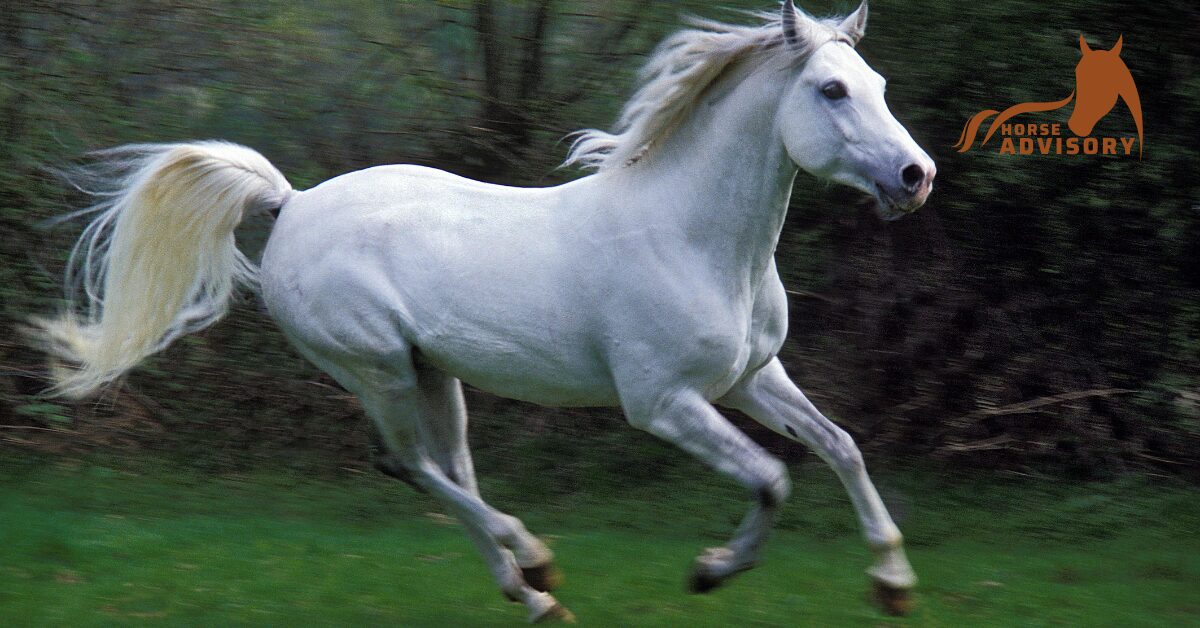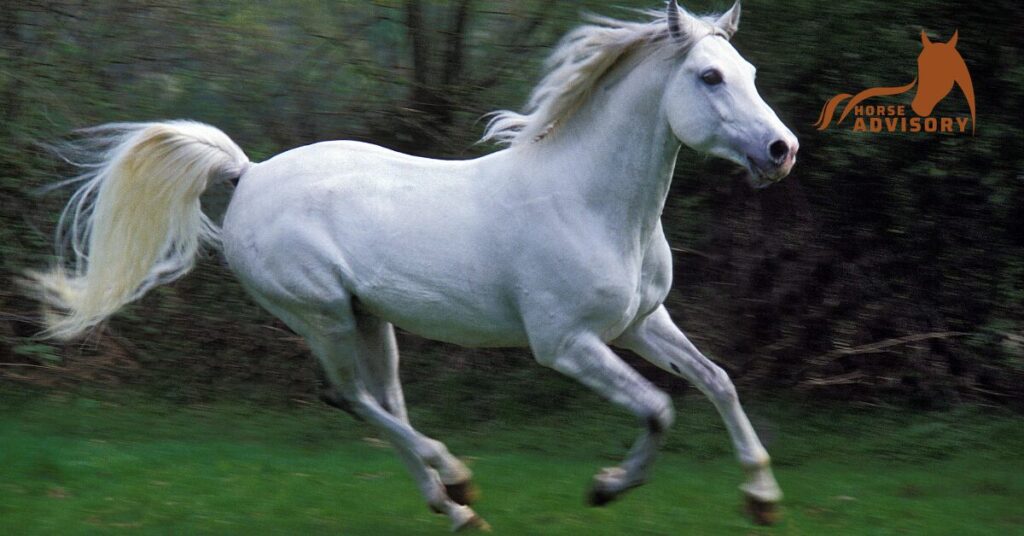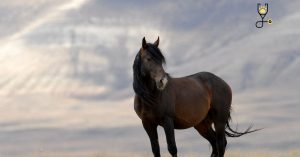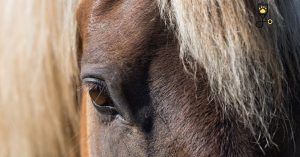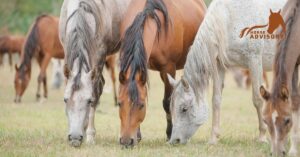The Arabian horse breed boasts a lineage that spans thousands of years. Known for their captivating beauty and balanced temperament, these horses have been favored for breeding purposes across different eras. Distinguished by a distinct head shape and large, expressive eyes, Arabians are recognized and admired worldwide. Their elegance, vitality, and intellect have significantly influenced almost every light horse breed in existence. Numerous pony and warmblood breeds also trace their athletic ancestry back to the versatile Arabian.
Arabian Horse History and Origins
The Arabian horse, with its rich history and distinctive characteristics, holds a special place in the equine world. This breed is one of the oldest in the world, tracing its roots back to the windswept deserts of the Arabian Peninsula. Here, thousands of years ago, Bedouin tribes began selectively breeding these horses, focusing on traits that would enable the animals to survive in the harsh desert environment. These included endurance, resilience, and the ability to thrive on sparse vegetation and limited water resources.
Bedouins not only valued these horses for their physical attributes but also for their mental ones. They appreciated the Arabian’s intelligence, loyalty, and gentle nature, which made them reliable companions during long and arduous desert journeys.
The close relationship between the Bedouins and their horses led to the development of many of the breed’s distinctive traits. For instance, the Arabian horse is known for its keen sensitivity to human emotions and its eagerness to please its owner, characteristics that have been deeply ingrained over centuries of close human contact.
Over time, the Arabian horse spread beyond the borders of the Arabian Peninsula, thanks to trade, conquest, and exploration. Their versatility and unique attributes made them highly sought after across different cultures and continents. From being war steeds in the Middle Ages to prized possessions of European nobility in more recent times, Arabian horses have left their mark on various aspects of human history. Today, they continue to be celebrated for their beauty, athleticism, and spirit, contributing their esteemed lineage to numerous other horse breeds around the globe.
Overview
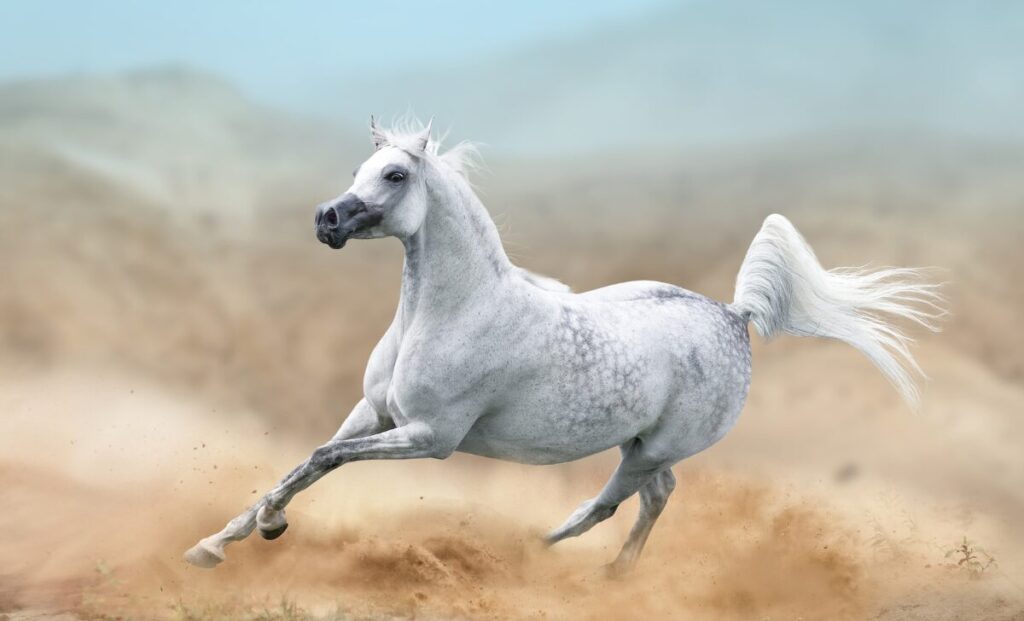
WEIGHT: 800 to 1,000 pounds
HEIGHT: 14 hands (56 inches) to 16 hands (64 inches)
BODY TYPE: Lithe, compact body; small, wedge-shaped head; dished facial profile, long, arched neck
BEST FOR: Experienced owners and riders
LIFE EXPECTANCY: 25 – 30 years
Arabian Horse Size
Arabian horses are generally smaller than other breeds, standing between 14.1 and 15.1 hands high. Despite their relatively small stature, they possess a strong build, with a broad chest and powerful hindquarters, which contribute to their remarkable endurance and speed.
Arabian Horse Breeding and Uses
The Arabian horse, with its storied past and impressive versatility, has a rich history of utility and performance. Historically, these horses played a critical role in the daily lives of the Bedouin tribes on the Arabian Peninsula. Due to their remarkable stamina, agility, and ability to endure the harsh desert conditions, they were primarily used for transportation across vast and unforgiving terrains. Their speed and endurance also made them invaluable assets in times of conflict, serving as war horses in many battles throughout history.
In more recent times, the Arabian horse’s refined elegance, athleticism, and unique gaits have made them a popular choice for a variety of equestrian sports. Their grace and balance make them natural performers in dressage, where precise movements and a harmonious connection with the rider are crucial.
Their agility and quickness lend themselves well to show jumping, while their inherent stamina and endurance make them exceptional competitors in long-distance trail competitions. Whether in the show ring or on the trail, Arabians are known for their competitive spirit and desire to perform.
But the influence of the Arabian horse extends beyond their own performances. Recognized for their superior genetic traits, they are frequently used in breeding programs to enhance other breeds. The goal is often to improve the stamina, conformation, and performance of these breeds while infusing them with the Arabian’s distinctive beauty and spirited nature. From the English Thoroughbred to the American Quarter Horse, the genetic influence of the Arabian can be seen in numerous horse breeds around the world, underscoring their significant contribution to the equine world.
Colors and Markings
Arabian horses are renowned for the variety of solid colors that grace their coats. The spectrum ranges from bay, gray, chestnut, and black to roan. While it’s common to find Arabians with white markings adorning their faces and legs, it’s relatively rare to see excessive white patches on their bodies. This is due to the breed’s genetic disposition towards solid colors.
A unique and fascinating feature of the Arabian breed is the phenomenon known as the “bloody shoulder.” This refers to a large, irregular patch of color, often contrasting against a gray coat. Although the origins of this term are lost in the mists of time, the striking marking adds an extra layer of intrigue and beauty to these already stunning creatures. Despite its dramatic name, the “bloody shoulder” is purely a color variation and has no impact on the horse’s health or performance.
Unique Characteristics of the Arabian Horse
Beyond their diverse color palette, Arabian horses possess several unique physical characteristics that set them apart from other breeds. One of the most distinctive features is their dished face, characterized by a concave profile that gives them a somewhat delicate and refined appearance. Complementing this are their large, expressive eyes, which are often described as windows into their intelligent and sensitive souls.
Arabian horses are also known for their elegantly arched necks and high tail carriages, both of which contribute to their overall graceful and spirited demeanor. Uniquely, they have fewer vertebrae and ribs compared to other horse breeds. This results in a more compact and balanced physique, further enhancing their athletic capabilities.
In terms of temperament, Arabians are generally intelligent, sensitive, and eager to please. They form strong bonds with their human caretakers and are known for their loyalty and affectionate nature. These traits, coupled with their physical attributes, make Arabians one of the most cherished and respected horse breeds in the world.
Diet and Nutrition
Arabian horses, like all equines, require a well-balanced diet to maintain optimal health and energy levels. The foundation of their diet should be high-quality hay or pasture, which provides essential fiber necessary for their digestive health. Grains such as oats, corn, or barley can be added to provide extra calories needed for work or growth, but should be fed in moderation to prevent obesity and other health problems.
In addition to hay and grains, a controlled amount of fruits and vegetables can be included in their diet. These provide important vitamins and minerals, and can also serve as a tasty treat. However, they should be given sparingly as too much can lead to digestive issues. Due to their susceptibility to certain metabolic disorders, it’s crucial to monitor their diet closely and adjust feed intake based on their age, size, activity level, and overall health.
Common Health and Behavior Problems
While Arabian horses are generally healthy, they can be prone to genetic disorders such as Lavender Foal Syndrome (LFS) and Cerebellar Abiotrophy (CA). LFS is a rare, fatal condition that affects newborn foals, causing neurological dysfunction. CA, on the other hand, is a degenerative neurological condition that typically becomes apparent within the first six months of life.
Behaviorally, Arabian horses are known for their spirited and sometimes hot-blooded nature. While this can make them excellent performers and competitors, it also requires experienced handling and training. They respond best to gentle, consistent methods and positive reinforcement. With the right approach, Arabians are capable of forming deep bonds with their handlers and achieving great things.
Grooming
Regular grooming is essential to maintaining an Arabian horse’s stunning appearance. But more than just keeping them looking their best, grooming also serves important health and bonding functions. Routine care includes brushing their coat to remove dirt and loose hair, promoting a healthy shine. Cleaning their hooves is also crucial to prevent infections and other hoof problems.
Grooming sessions also provide an opportunity to check for any signs of injury or disease, such as cuts, swellings, or skin conditions. Finally, the one-on-one time spent grooming can strengthen the bond between horse and handler, fostering trust and mutual respect. Despite their spirited nature, Arabians are known to be quite affectionate, and many enjoy the attention and care that come with regular grooming.
Champion and Celebrity Arabian Horses
Arabian horses have been the companions of many notable figures throughout history, and some have become famous in their own right. One such horse is Marengo, the renowned warhorse of Napoleon Bonaparte. Named after the Battle of Marengo, this horse was said to be Bonaparte’s favorite and carried him in several key battles. Marengo’s courage and endurance under the most challenging circumstances exemplified the traits for which Arabian horses are celebrated.
In more recent times, Arabian horses continue to make their mark in equestrian sports and breeding programs. A shining example is Marwan Al Shaqab, a stallion that has won multiple championships in international Arabian horse shows. Known for his striking appearance and exceptional genetics, Marwan Al Shaqab is considered one of the most influential Arabian stallions of modern times. His offspring continue to dominate competitions worldwide, carrying on his legacy.
These examples illustrate the impact that Arabian horses have had, both historically and in the present day. Whether serving as trusted war companions or competing in top-tier equestrian events, these horses have demonstrated time and again their remarkable athleticism, beauty, and resilience.
Is the Arabian Horse Right for You?
Arabian horses, with their captivating beauty and versatile capabilities, can be an appealing choice for many horse enthusiasts. However, they do require knowledgeable care and handling due to their spirited nature. Arabians are known for their intelligence and sensitivity, traits that call for a handler who understands and respects their unique characteristics. They respond best to consistent training methods that use positive reinforcement and avoid harsh treatment.
While they are athletic and enjoy physical activities, Arabian horses also need mental stimulation. Their intelligent and curious nature means they thrive when given tasks that challenge them mentally. This could range from advanced training exercises to simple games that keep them engaged. Their sensitivity, meanwhile, means they form strong bonds with their handlers and can be deeply affected by their environment and the people around them.
In essence, Arabian horses are best suited to individuals who can offer consistent training and appreciate their sensitive and intelligent nature. They need a caretaker who is not only knowledgeable about their specific needs but also patient and understanding. In return, Arabian horses offer loyalty, affection, and the potential for a deeply rewarding companionship. Their energetic spirit and striking beauty make them a joy to work with, and their affectionate nature can lead to a powerful bond between horse and handler.
How to Adopt or Buy an Arabian Horse
If you’re interested in owning an Arabian, consider adopting from a rescue organization or purchasing from a reputable breeder. Ensure you’re well-informed about the horse’s health, temperament, and history before making a decision.
In conclusion, the Arabian horse, with its rich history and distinctive characteristics, holds a special place in the equine world. Whether you’re an equestrian sports enthusiast, a casual rider, or a horse lover, getting to know this breed can be a truly rewarding experience.
